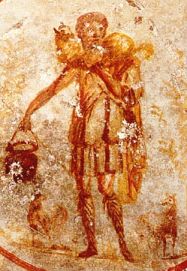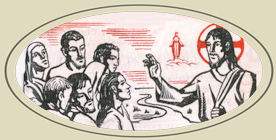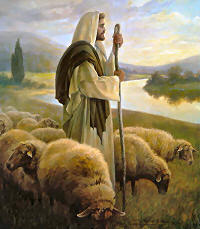» Enjoy our Liturgical Seasons series of e-books!
I am the good shepherd. A good shepherd lays down his life for the sheep. A hired man, who is not a shepherd and whose sheep are not his own, sees a wolf coming and leaves the sheep and runs away, and the wolf catches and scatters them. This is because he works for pay and has no concern for the sheep. I am the good shepherd, and I know mine and mine know me, just as the Father knows me and I know the Father; and I will lay down my life for the sheep (Jn 10:11-15).
Today is the feast of St. Mark which is superseded by the Sunday Liturgy.
Click here for commentary on the readings in the 1962 Missal of the Roman Rite.
Sunday Readings
The first reading is taken from the Acts of the Apostles 4:8-12. This excerpt is a sequence of what was described in last Sunday's first reading. Peter had cured a cripple-from-birth and told the people that it was not by his own power that he did this, but through the power of Jesus of Nazareth, whom the Jews had crucified.
The second reading is from the first Letter of John 3:1-2 in which he sets out in a couple of sentences the basic effect of the Incarnation. Already in this life men are made children of God. Because we are God's children here below we shall see him as he is in the future life.
The Gospel is from St. John 10:11-18. The image of Christ as our Good Shepherd has always appealed to human nature. One of the earliest paintings of Christ in the Roman catacombs represents him as carrying an injured sheep on his shoulders. This is a manifestation of love which touches our innermost feelings. We do not mind being likened to sheep in this context. There is something guileless about a sheep, and at the same time a lot of foolishness. Does not this describe the vast majority of men, even many of those who openly oppose Christ? Is there not something very sheeplike about the man who, because God gave him a limited intellect, thinks he knows all things and needs no further help from God? The sheep who thinks it knows as much, and even more, than the shepherd and sets out to fend for itself, is no more foolish than the man who thinks he can do without God's revelation and God's Church.
 Indeed we all act like sheep on many occasions, when it comes to the things that concern our spiritual welfare. We often ramble off from the flock to nibble at little bits of forbidden pasture. However, we have a Shepherd who understands us, one whose patience and love are infinite. He is always ready to go after us when we stray too far; his voice is constantly reaching out to us in missions, retreats, sicknesses, crosses and other various ways. How many times have we already felt his loving grace calling and helping us back to the safety of his fold?
Indeed we all act like sheep on many occasions, when it comes to the things that concern our spiritual welfare. We often ramble off from the flock to nibble at little bits of forbidden pasture. However, we have a Shepherd who understands us, one whose patience and love are infinite. He is always ready to go after us when we stray too far; his voice is constantly reaching out to us in missions, retreats, sicknesses, crosses and other various ways. How many times have we already felt his loving grace calling and helping us back to the safety of his fold?
There are many who are not so fortunate as we, who either through no fault of their own or through their own fault do not hear his voice and do not know or follow him. This is an opportunity he gives us to show how we appreciate all he has done for us. He died on the cross for all men. He wills all men to profit by his death, and his statement "them also I must bring" is a direct appeal to us to cooperate with him in this work. Every Christian is a missionary. The very fact of living the Christian life in its entirety, in the midst of our fellowmen, is of itself a powerful example to outsiders. It influences for good the lax Christian and the non-Christian. It makes them stop and think and look into their consciences. This is generally the first step on the road back to God.
The devout Christian will not stop at good example only. If he truly loves God, he must truly love his neighbor and must want him to have a share in his own good fortune. He knows there is welcome and room in heaven for all men, and he knows that the greater the number there the greater will be God's eternal glory. He will strive then by every available means to help his neighbor into Christ's fold.
After good example, prayer will be his most potent weapon. Day in, day out the devout Christian must pray for the conversion of his fellowmen who are wandering aimlessly in the barren desert of this life far from God. He must also learn all he can about the truths of his faith in order to be able to help honest enquirers. He must also cooperate with any parochial or diocesan societies for the propagation of the faith, insofar as his family and financial state allow him.
The sermon preached by our Savior nearly two thousand years ago is still echoing and re-echoing around the world, calling on his faithful flock to do all in their power to help those other children of God who are still outside the fold. Do not shut your ears to this call of Christ today. Give him a helping hand by helping your fellowman to see the light of the true faith.
—Excerpted from The Sunday Readings by Fr. Kevin O'Sullivan, O.F.M.
Commentary for the Readings in the 1962 Roman Missal:
Third Sunday After Easter
 "A little while and you shall see Me no longer. . .because I go to the Father. . .And you therefore have sorrow now; but I will see you again, and your heart shall rejoice, and your joy no one shall take from you" (Gospel).
"A little while and you shall see Me no longer. . .because I go to the Father. . .And you therefore have sorrow now; but I will see you again, and your heart shall rejoice, and your joy no one shall take from you" (Gospel).
Christianity is a religion of joy! (Introit). May "those. . .in error" receive this "light" (Prayer). Jesus predicts, however, that our joy can never be perfect here. The "cross before the crown" (Alleluia Verse) would indeed be a mystery had no Jesus lived it out for us.
An unbelieving "world shall rejoice" because it regards Him as dead and gone. But Christ departs only for a "little while" (Gospel) to test our love and loyalty. He shall return (as indicated by little figure of Christ in the clouds).
Prepare for His coming "in the day of visitation" by good example. "Behave yourselves honorably among pagans; that they ... observing your good works" for God and country (described in the Epistle) may recognize that Christianity is a religion of joy, now and forever!
—Excerpted from My Sunday Missal, Confraternity of the Precious Blood
Meditation: The Lord is My Shepherd
We are a precious gift the Father has confided to Jesus. Thine they were: to me Thou gavest them. All that the Father gives me will come to me; and him that comes to me I will not cast out. This is the Father's will, that I should not lose one of these precious ones He has given to me. This charge which the Father has given me is more precious than anything whatsoever.
Jesus sees his own raison d'etre as that of doing the will of the Father, and the will of the Father is precisely that He should care for each one of us and give us eternal life.
All that Jesus is is precisely for me. His care of me never slackens.
"The Lord is my shepherd, I can want for nothing." If I really believed this, how different my life would be! I would never willingly jib at what happens to me since I would everything as at least permitted by Him, knowing He will make everything turn to my good I would stop trying to run my own life, preventing this or that…I would cease to care for the judgements of others, whether they like me or not, whether they think well or ill of me. I would cease wanting to feel sure about everything, above all about my spiritual life: anxious, fearful, discouraged, plagued by guilt feelings… If my faith in the unfailing tender care of my Shepherd is real, how could I allow such self-occupation?
The Shepherd psalm is one Jesus must have prayed a thousand and more times to His Father. "The Lord carried you, as a man carries his child, all along the road you travelled"…at this hour you were led to the cross. Where are the nice green pastures on that stony and painful way? Were the still waters in His burning thirst? Did He feel His head and body were being washed and anointed with oil when the crown of thorns was pressing against His temples?
"He leads me along the right path: he is true to his name…Surely goodness and kindness shall follow me all the days of my life."
Had Jesus not held firmly to this certainty, that whatever it seemed or felt like this was the truth, the real nature of things, then we would not have been redeemed. His faith would have failed. But as it proved, His faith remained steadfast and triumphed.
The Good Shepherd is risen. He who laid down His life for the sheep, who died for His flock. He is risen. Alleluia!
—Ruth Burrows, Through Him, With Him, In Him






